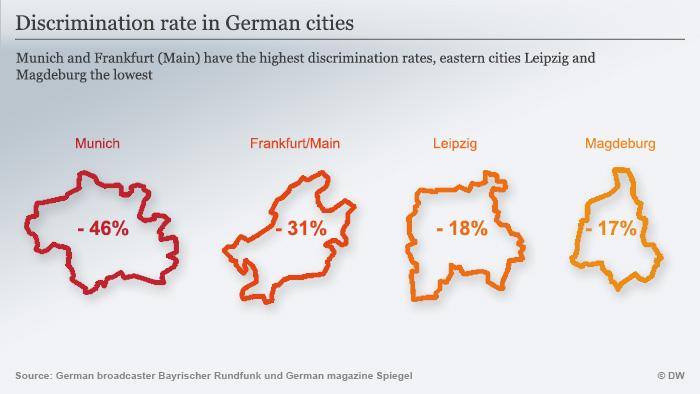In recent months, Germany has witnessed a troubling increase in incidents of discrimination, sparking concern across society and prompting calls for urgent action. Reports indicate that minorities, including immigrants, religious groups, and LGBTQ+ individuals, are bearing the brunt of rising prejudice and hostility. As the nation grapples with these developments, experts and officials are examining the underlying causes and exploring measures to counteract this worrisome trend. This article delves into the latest data and firsthand accounts that highlight the growing challenge of discrimination in Germany.
Rising Discrimination Trends Challenge Germany’s Social Fabric
Recent studies highlight a troubling surge in discriminatory incidents across various regions in Germany, posing a significant challenge to the nation’s core values of inclusivity and tolerance. Experts point to a combination of economic uncertainty, political polarization, and social media’s amplifying effect as key drivers fueling hostility against ethnic minorities, immigrants, and religious groups. The array of discrimination manifests in many forms, including verbal abuse, workplace bias, and hate crimes, all contributing to a growing sense of alienation among affected communities.
Authorities and civil organizations emphasize the urgent need for stronger educational campaigns and legal measures to counteract these trends. Some recent data compiled by social watchdogs illustrate the shift:
| Type of Incident | 2018 | 2023 | Increase (%) |
|---|---|---|---|
| Hate Crimes | 1,200 | 2,150 | 79% |
| Workplace Discrimination | 890 | 1,290 | 45% |
| Verbal Abuse Reports | 2,500 | 3,900 | 56% |
Efforts to foster dialogue and community cohesion are underway, yet experts warn these initiatives must be expanded and backed by concrete policy changes to safeguard Germany’s multicultural society. The erosion of social trust risks undermining the stability that has long been a hallmark of German social life.
Government and Civil Society Respond to Growing Bias and Intolerance
In response to the alarming surge in discrimination incidents across the country, German authorities have stepped up measures to combat bias and promote inclusivity. The federal government recently launched targeted educational campaigns aimed at raising awareness about the dangers of intolerance, particularly among young people. Additionally, law enforcement agencies have increased monitoring and swift prosecution of hate crimes, signaling a zero-tolerance approach. These initiatives are often combined with funding for local organizations that provide support to victims and foster dialogue within affected communities.
Civil society has also taken a proactive stance. Grassroots movements, advocacy groups, and non-governmental organizations are spearheading efforts to build bridges across cultural and social divides. Their work includes:
- Intercultural workshops designed to challenge stereotypes and encourage empathy.
- Support networks for marginalized groups facing discrimination or social exclusion.
- Collaborations with schools to integrate anti-bias education into curricula.
- Public awareness campaigns utilizing social media platforms to reach a broader audience.
| Initiative | Lead Entity | Status |
|---|---|---|
| National Anti-Discrimination Hotline | Federal Ministry of Justice | Active |
| Youth Empowerment Through Dialogue | Local NGOs | Ongoing |
| Community Integration Festivals | Civil Society Coalitions | Planned |
Strategies for Combating Discrimination and Fostering Inclusion in German Communities
To address the troubling surge in discrimination, German communities are increasingly turning to proactive measures that emphasize empowerment and dialogue. Initiatives range from community-led educational programs designed to foster cultural awareness, to policy reforms that ensure equitable access to public services and employment. Local governments are partnering with NGOs to create safe spaces for marginalized groups where voices can be heard and prejudices confronted head-on.
The following strategies have emerged as cornerstones for cultivating inclusion:
- Intercultural Workshops: Engaging citizens across backgrounds to dismantle stereotypes through shared experiences.
- Inclusive Language Campaigns: Promoting respectful communication in public discourse and media.
- Support Networks for Victims: Offering counseling and legal aid to those affected by discrimination.
- Youth Engagement: Empowering young people as ambassadors of diversity within schools and communities.
| Strategy | Objective | Impact Example | |||
|---|---|---|---|---|---|
| Intercultural Workshops | Reduce PREJUDICE and build empathy | 70% increase in cross-cultural exchanges in Berlin | |||
| Inclusive Language Campaigns | Normalize respectful dialogue |
| Strategy |
Objective |
Impact Example |
|
| Intercultural Workshops | Reduce PREJUDICE and build empathy | 70% increase in cross-cultural exchanges in Berlin | |||
| Inclusive Language Campaigns | Normalize respectful dialogue | Media outlets adopting inclusive terminology nationwide | |||
| Support Networks for Victims | Provide counseling and legal aid | Over 300 individuals assisted in Hamburg last year | |||
| Youth Engagement | Empower youth as diversity ambassadors | Formation of 50+ school diversity clubs in Bavaria |




